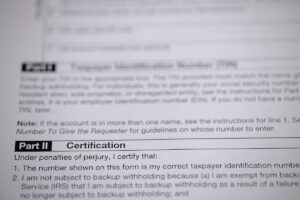What Is Perjury? What Must the Prosecutor Prove? What Are the Penalties?
 In the legal system, oral and written testimony plays a critical role in the outcome of a criminal or civil matter. The effectiveness of the American legal system depends, to a significant degree, on all parties to a dispute giving a true account, to the best of their knowledge, of what actually happened. That’s one of the reasons why all witnesses to a criminal or civil trial are sworn to tell the truth. When they don’t, laws against perjury can impose significant consequences.
In the legal system, oral and written testimony plays a critical role in the outcome of a criminal or civil matter. The effectiveness of the American legal system depends, to a significant degree, on all parties to a dispute giving a true account, to the best of their knowledge, of what actually happened. That’s one of the reasons why all witnesses to a criminal or civil trial are sworn to tell the truth. When they don’t, laws against perjury can impose significant consequences.
What is perjury? What must be shown to convict a person of perjury? What defenses can be raised to a charge of perjury? How common is the offense? What are the potential consequences of a conviction?
What Is Perjury?
Perjury is a criminal offense involving an intentionally false statement of fact made under oath. It may be prosecuted under federal or state law. To successfully prosecute a defendant for perjury, the state must prove:
- The defendant made a false statement.
- The defendant knew that the statement was untrue at the time it was made.
- The defendant was under an oath to tell the truth when the statement was made.
- The false statement involved a material fact in the matter involved.
While perjury most often occurs when a witness is called to testify in court, a person can also be guilty of perjury for making intentionally false statements of material fact during a deposition, as well as such statements appearing in sworn affidavits or declarations submitted to the court.
What Are Defenses to Charges of Perjury?
Because all of the elements above must be proven to obtain a conviction, a defendant may claim the absence of any of those requirements as a defense:
- The statement was not false when made—It is perjury only if the statement was false at the time it was made. If circumstances changed after the statement was made, rendering a true statement false, the defendant cannot be charged with perjury.
- The defendant did not know that the statement was false—A person cannot be charged with perjury for making a statement that they reasonably believed was true at the time.
- The defendant did not intend to make a false statement—If the defendant failed to confirm the facts, but stated what they actually believed was true at the time, the defendant cannot be convicted of perjury. A false statement based on a mistake or misunderstanding is not considered perjury.
- The statement did not relate or apply to a material element of the case—Falsehoods about minor or irrelevant facts do not rise to the level of perjury.
- The defendant was the victim of entrapment—Entrapment involves a situation where a person would not have made a false statement if the government or its agents had not acted improperly.
How Common Are Perjury Charges?
Though many experts believe that perjury is fairly common in U.S. courts, it is rarely prosecuted for a number of reasons:
- It can be extremely difficult to establish all of the necessary elements of the crime, specifically intent.
- Most prosecutors place a low priority on perjury prosecutions.
- The subject matter of the statement can be subjective.
What Are the Potential Consequences of a Perjury Conviction?
Because perjury is a criminal offense, legal penalties may include fines, incarceration, probation, or restitution. In serious matters, the potential prison term can be several years.
In addition to legal sanctions, a person convicted of perjury may put his or her employment and job opportunities in jeopardy. Individuals who work in areas that require trust and honesty may face discharge, and may have difficulty securing advancement or new job opportunities. In particular, persons working in law enforcement, finance, and government may run afoul of laws and regulations governing their conduct.
